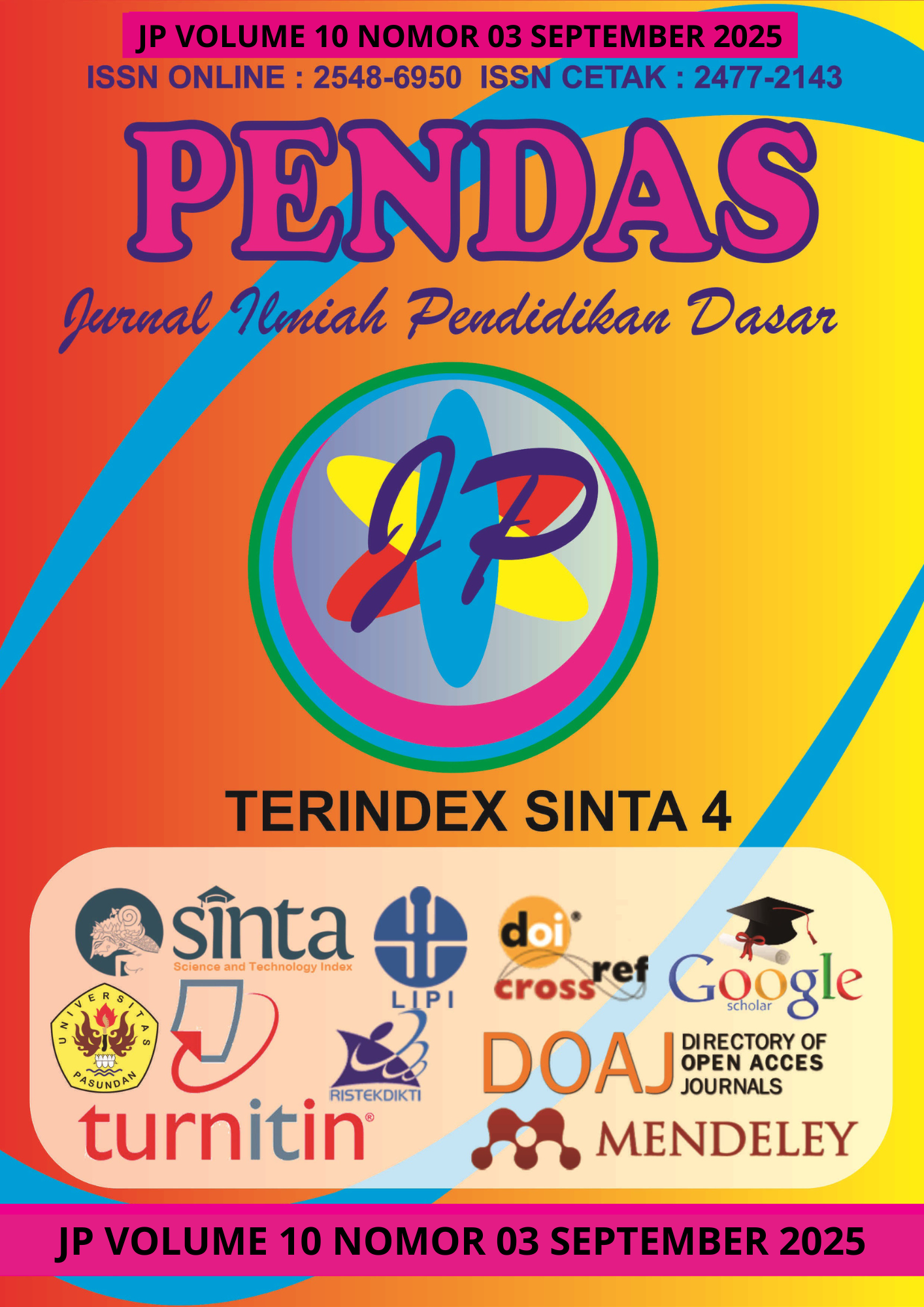PENGARUH MODEL PJBL TERHADAP KEMAMPUAN BERPIKIR KREATIF SISWA SD PADA MATA PELAJARAN IPAS
DOI:
https://doi.org/10.23969/jp.v10i03.32262Keywords:
Project Based Learning, Creative Thinking, IPASAbstract
This study examines students’ creative thinking skills in the IPAS subject using the Project Based Learning (PjBL) model in Grade V. The purpose of this study was to determine the difference in the effect of the PjBL model on creative thinking skills compared to conventional learning models. This research employed a quantitative approach with a quasi-experimental design of the non-equivalent control group type. The population consisted of all Grade V students at SDN Maja Selatan VI, with a sample of 39 students, comprising 20 students in the experimental class and 19 students in the control class. The normality test results showed significance values of 0.074 > 0.05 for the experimental class and 0.118 > 0.05 for the control class, indicating that the data were normally distributed. The homogeneity test using Levene’s Test produced a significance value of 0.357 > 0.05, indicating that both groups were homogeneous. The t-test results revealed that the calculated t-value exceeded the critical t-value and the significance value was 0.000 < 0.05, indicating a significant difference in creative thinking skills between the experimental and control classes. Therefore, the application of the PjBL model has a significant effect on improving students’ creative thinking skills in the IPAS subject.
Downloads
References
braham, I., & Supriyati, Y. (2022). Desain Kuasi Eksperimen Dalam Pendidikan: Literatur Review. Jurnal Ilmiah Mandala Education, 8(3), 2476–2482. https://doi.org/10.58258/jime.v8i3.3800
Aulia, N. (2023). Penerapan Model Project Based Learning untuk Meningkatkan Kemampuan Berpikir Kreatif Siswa di Sekolah Dasar. Jurnal Riset Madrasah Ibtidaiyah (JURMIA), 3(1), 1–7. https://doi.org/10.32665/jurmia.v3i1.338
Azizah Siti Lathifah, Khoirunisa Hardaningtyas, Pratama, Z. A., & Moewardi, I. (2024). Penerapan Teori Belajar Konstruktivisme dalam Meningkatkan Keaktifan dan Hasil Belajar Siswa. DIAJAR: Jurnal Pendidikan Dan Pembelajaran, 3(1), 36–42. https://doi.org/10.54259/diajar.v3i1.2233
Fadila, F., & Fitriyeni. (2024). Implementasi Kurikulum Merdeka Belajar Dalam Pembelajaran Ipas Di Sekolah Dasar. Didaktika: Jurnal Pendidikan, 13(4), 4357–4366. https://doi.org/10.69875/djosse.v1i1.103
Fahrezi, I., Taufiq, M., Akhwani, A., & Nafia’ah, N. (2020). Meta-Analisis Pengaruh Model Pembelajaran Project Based Learning Terhadap Hasil Belajar Siswa Pada Mata Pelajaran IPA Sekolah Dasar. Jurnal Ilmiah Pendidikan Profesi Guru, 3(3), 408–416. https://doi.org/10.23887/jippg.v3i3.28081
Fatmawati. (2022). Kreativitas dan Intelegensi Fatmawati. Jurnal Pendidikan Dan Konseling, 4(5), 188–195. https://journal.universitaspahlawan.ac.id/index.php/jpdk/article/view/6562
Febrianti, A. (2025). Inovasi Pendidikan dalam Meningkatkan Kolaborasi Siswa melalui Pendekatan Berbasis Kelompok dan Media Digital. Karimah Tauhid, 4(2), 1351–1357.
Kartikasari, I. A., Usodo, B., & Riyadi. (2022). The Effectiveness Open-Ended learning and Creative Problem Solving Models to Teach Creative Thinking Skills. Pegem Journal of Education and
Instruction, 12(4), 29–38. https://doi.org/10.47750/pegegog.12.04.04
Lela, J., Taruli, D., & Manalu, G. J. (2024). Pengaruh Metode Pembelajaran Brainstorming terhadap Kreativitas Belajar PAK Peserta Didik kelas VIII SMP Negeri 2 Muara Kabupaten Tapanuli Utara Tahun Pembelajaran 2024 / 2025. Jurnal Teologi Dan Pendidikan Agama Kristen, 1(1), 52–62.
Lestari, S., Manurung, A. A., & Sumarni, S. (2024). Teori Belajar Konstruktivisme dan Implikasi dalam Pembelajaran IPA SD. JIIP - Jurnal Ilmiah Ilmu Pendidikan, 7(9), 10622–10628. https://doi.org/10.54371/jiip.v7i9.5476
Maryanto, N. R., & Siswanto, R. D. (2021). Analisis Kemampuan Berpikir Kreatif Matematis Siswa Smp Ditinjau Dari Gaya Kognitif Reflektif, Impulsif, Dan Gender. ANARGYA: Jurnal Ilmiah Pendidikan Matematika, 4(1), 109–118. https://doi.org/10.55099/jmt.v3i2.85
Permana, K. A. D., Gading, I. K., & Agustina, I. G. A. T. (2023). Model Project Based Learning Untuk Meningkatkan Kemampuan Berpikir Kreatif dan Hasil Belajar IPA Kelas V SD. INNOVATIVE: Journal Of Social Science Research Volume, 3(2), 14692–14704. https://doi.org/10.23969/jp.v8i2.9534
Prayogo, M. S., & Ramadhan, F. A. (2024). Penerapan Pembelajaran Ilmu Pengetahuan Alam dan Ilmu Pengetahuan Sosial Berbasis Kurikulum Merdeka di Madrasah Ibtidaiyah. 1(1), 40–49.
Ramdani, N. G., Fauziyyah, N., Fuadah, R., Rudiyono, S., Septiyaningrum, Y. A., Salamatussa’adah, N., & Hayani, A. (2023). Definisi Dan Teori Pendekatan, Strategi, Dan Metode Pembelajaran. Indonesian Journal of Elementary Education and Teaching Innovation, 2(1), 20–31. https://doi.org/10.21927/ijeeti.2023.2(1).20-31
Risky Winarta Naibaho, Saprina Marbun, Sella A L Br Siagian, Eka Rismaynarti, & Agum Budianto. (2025). Tantangan dalam Implementasi Kurikulum Merdeka di SD N 060851 Jl. Madong Lubis No. 1, Sei Kera Hilir II. Jurnal Sadewa : Publikasi Ilmu Pendidikan, Pembelajaran Dan Ilmu Sosial, 3(2), 53–62. https://doi.org/10.61132/sadewa.v3i2.1674
Santilli, T., Ceccacci, S., Mengoni, M., & Giaconi, C. (2025). Virtual vs. traditional learning in higher education: A systematic review of comparative studies. Computers and Education. https://doi.org/10.1016/j.compedu.2024.105214
Sarkity, D., & Fernando, A. (2023). Maritime-Related Topics on Natural Science Learning in Independent Curriculum. BIO Web of Conferences, 79. https://doi.org/10.1051/bioconf/20237902003
Sitorus, H. A., Siagian, A. F., & Barus, M. (2024). Pengaruh Model Project Based Learning terhadap Kemampuan Berpikir Kreatif Siswa Kelas V UPTD SD 122350 Pematangsiantar. Emergent Journal of Educational Discoveries and Lifelong Learning (EJEDL), 2(2), 32–39. https://doi.org/10.47134/emergent.v2i1.31
Downloads
Published
Issue
Section
License
Copyright (c) 2025 Pendas : Jurnal Ilmiah Pendidikan Dasar

This work is licensed under a Creative Commons Attribution 4.0 International License.














































